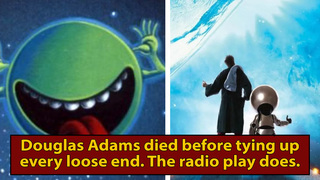'Hitchhiker's Guide To The Galaxy' Loose Ends Finally Got Fixed (On The Radio?)

For a series that makes Futurama look morose, the Hitchhiker's Guide to the Galaxy novels ended on a real bummer.

The fifth and final installment, 1992's Mostly Harmless, is famously bleak, ending with the destruction of Earth. Thus the unceremonious deaths of every character readers spent a decade and a half growing to love. It turned out Douglas Adams was, as the kids say, going through it during its writing and couldn't bring himself to create anything but a complete downer. Some of us get bangs; British science-fiction authors destroy souls.
Don't Miss
Adams was never satisfied with the ending, nor was anyone else, so he intended for years to write a sixth book, but if there's anything Adams was better at than bone-dry slapstick, it was intending to do things. He was kind of the George R. R. Martin of sci-fi comedy, and his death in 2001 seemed to settle the matter of his characters' deaths too. A sixth book was written by the Artemis Fowl guy, which picked up where Mostly Harmless left off, but it was little more than fan-fiction and hardly a satisfactory solution, either: They get rescued by a passing spaceship. Again.
But the novels themselves were actually an adaptation, and then a continuation, of Adams's radio plays, which were shockingly still a thing in the '70s. Adapting the later novels for the radio was another thing he swore he'd get around to at some point, going so far as to begin collaborating with friend and writer Dirk Maggs on their direction throughout the '90s. After Adams's death, Maggs felt obligated to continue their work, and when he delivered the adaptation of Mostly Harmless in 2005, the ending was ... notably different. And perfect. It ties up every loose end Adams had a maddening habit of leaving to dangle.
It turns out the Babel fish that all the main characters had in their ears, whose powers were never really fully explained, had time-space traveling abilities similar to the dolphins of Adams's universe. (They're actually the ones who taught the dolphins, in return "the Babel fish learnt a thing or two about where to have a good time from the dolphins.") They're also ruthlessly self-preserving, so when they sensed themselves in mortal danger, they winked out of that particular dimension and took their hosts with them.
When Arthur asks Ford why the Babel fish never saved their lives before, he responds, correctly, "You didn't die before." Are we really putting psychic powers past the magical fish?
Most appropriately, they end up in the literally least probable place: Milliways, the restaurant at the end of the universe. And who else do they find there? Marvin, having been resurrected from his heartbreaking death by the power of his warranty. Also? All the dolphins. They're living it up in a series of seemingly infinite and hopefully deeply Lisa Franky blue lagoons surrounding the restaurant. When a member of the party calls over their waitress, she's revealed to be Fenchurch -- you know, the love of Arthur's life who tragically disappeared in a hyperspace accident at the beginning of Mostly Harmless and was never heard from again. She'd ended up at Milliways, where everyone ends up eventually, so she decided to stick around and wait for Arthur. The last lines of the story are a conversation between them.

We'll give you a minute.
Manna is probably still crying on Twitter.
Top image: Pan Books